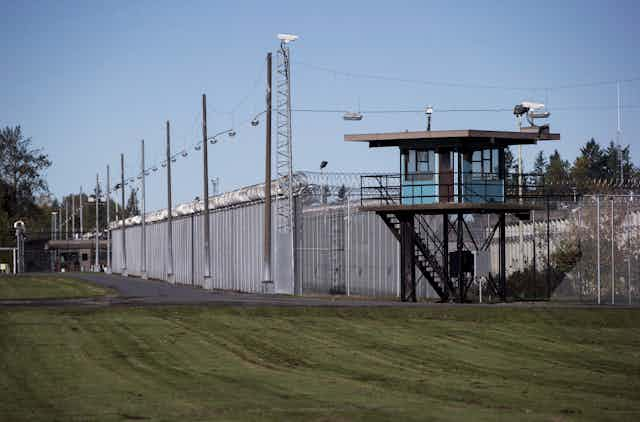The Canadian government recently proposed earmarking $325 million in the 2024 federal budget to upgrade federal immigration detention centres to hold more people. The budget also proposes to amend the law to allow federal prisons to be used to detain “high-risk” immigrants.
The government’s decision comes after all Canadian provinces committed to ending their agreements with the Canada Border Services Agency (CBSA) to detain migrants in provincial jails. In 2022, British Columbia became the first province to announce it would end its agreement with CBSA, stating the practice conflicts with provincial, national and international human rights commitments.
Human rights organizations have sharply criticized the federal government’s plan, saying it’s “doubling down on its harmful rights-abusing system.”
In the last quarter of 2023, 1,662 migrants were detained in Canada. Most of them were held if a CBSA officer believed the person was unlikely to appear for an examination, hearing or proceeding. Many were held in detention centres and provincial jails, where conditions are often punitive.
In response to critics, Immigration Minister Marc Miller said detained migrants would be housed separately from other prisoners “because they are not criminals.” However, placing migrants in prisons risks serious violations of their human rights and perpetuates narratives about the criminality of immigrants.
Human rights concerns
The CBSA operates federal immigration holding centres (IHCs) and holds contracts with provinces to use their jails to detain immigrants under the Immigration and Refugee Protection Act. Around one-fifth of migrant detainees are currently held in provincial jails.
While provinces ending immigrant detention is cause for celebration, we’ve cautioned that without legislative change, external oversight and accountability over CBSA, human rights concerns are likely to continue.

Migrant detention, regardless of facility type, violates migrants’ human rights. Canada does not place any limit on how long a migrant can be detained. This is in contrast to citizens, who are entitled to know how long they’re being detained and access procedural justice such as routine reviews of detention and a clear appeals process.
Immigrants facing removal can be detained if a CBSA officer classifies them as high risk. There is no policy or law or specific evidence required, or appeals possible, if a person is deemed high-risk. These often ad-hoc decisions can result in indefinite imprisonment without charges or trial and go against basic principles of fairness, justice and due process.
The government’s plans refer to those people deemed a high-risk. However, critics say the CBSA is exaggerating the extent of public safety concerns. The use of prisons further entrenches narratives that paint migrants as criminals who pose a risk to broader society. Those labelled risky are often detained for posing flight risks, suffering mental health issues or having records of minor criminality in their past.
Read more: Immigration detention continues in Canada despite the end of provincial agreements
Ebrahim Toure, a stateless refugee claimant, was held in immigration detention by CBSA for six years. Toure was deemed a risk because of a previous conviction for selling pirated DVDs in Atlanta, Ga. Toure said: “The reason I came [to Canada] is to seek refuge, but the punishment I got for that — I never experienced that anywhere else.”
Experts have argued Canada’s use of immigrant detention is a form of penal nationalism. This is defined as a populist strategy that treats migrants as criminal threats to the nation and national identity. Narratives of criminality and risk are largely constructed and based on the idea of “securing” borders from the “other.”
Detention in IHCs and prisons has also been criticized for blurring lines of accountability and transparency. For example, while IHCs are federally operated by CBSA, the day-to-day labour and management of these institutions is provided through private-sector contracts.
Violating Canada’s obligations

Canada is a signatory to international treaties designed to uphold the safety, dignity and rights of migrants and asylum-seekers. These include the United Nations Convention relating to the Status of Refugees, the Protocol Relating to the Status of Refugees as well as global compacts on migration and refugees.
In 2021, Canada articulated its commitment to promoting balanced public narratives on migrants, including refugees. Yet, the detention of migrants not only perpetuates fear-mongering narratives of migrants and refugees, it also violates the internationally recognized right to claim asylum without fear of punishment.
Read more: The detention of migrants in Canadian jails is a public health emergency
The government has increased investment in alternatives to detention including electronic monitoring, community case management and voice reporting. Such alternatives do address some of the human rights violations migrants face in detention centres and jails. However, they continue to criminalize migrants who are entitled to make asylum claims in Canada.
The government’s intention to put migrants in federal prisons risks further dehumanizing and criminalizing refugees, asylum-seekers and other immigrants. Canadians should oppose legal amendments that enable the use of federal correctional facilities for immigration detention.
Canada bills itself as a human rights champion, but this record is uneven — and this proposal could become the latest strike against it.

